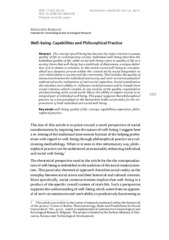Well-being, Capabilities and Philosophical Practice
Апстракт
The concept of well being has become the main criterion to assess quality of life in contemporary society. Individual well-being describes the individual quality of life, while social well-being refers to quality of life in a society. Given that well-being has a multitude of dimensions, a unique definition of it is elusive to scholars. In this article social well-being is conceptualised as a dynamic process within the context set by social integration as one’s relationship to society and the community. This includes the quality of interaction between the individual and society and one’s ‘social actualisation’ understood as the realisattion of one’s social capacities. Social actualisation also involves one’s ability to influence social processes and to benefit from social cohesion, which consists, in any society, of the quality, organisation and functioning of the social world. Hence the ability to impact society is an integral part of individual well being. This paper suggests that phi...losophical practice as a new paradigm in the humanities holds out promise for the improvement of both individual and social well-being.
Кључне речи:
well-being / quality of life / concept / iskustvoИзвор:
Filozofija i društvo / Philosophy and Society, 2014, 105-120Издавач:
- Beograd : Institut za filozofiju i društvenu teoriju
Финансирање / пројекти:
- Криминал у Србији: феноменологија, ризици и могућност социјалне интервенције (RS-MESTD-Integrated and Interdisciplinary Research (IIR or III)-47011)
Институција/група
IFDTTY - JOUR AU - Bulatović, Aleksandra PY - 2014 UR - http://rifdt.instifdt.bg.ac.rs/123456789/224 AB - The concept of well being has become the main criterion to assess quality of life in contemporary society. Individual well-being describes the individual quality of life, while social well-being refers to quality of life in a society. Given that well-being has a multitude of dimensions, a unique definition of it is elusive to scholars. In this article social well-being is conceptualised as a dynamic process within the context set by social integration as one’s relationship to society and the community. This includes the quality of interaction between the individual and society and one’s ‘social actualisation’ understood as the realisattion of one’s social capacities. Social actualisation also involves one’s ability to influence social processes and to benefit from social cohesion, which consists, in any society, of the quality, organisation and functioning of the social world. Hence the ability to impact society is an integral part of individual well being. This paper suggests that philosophical practice as a new paradigm in the humanities holds out promise for the improvement of both individual and social well-being. PB - Beograd : Institut za filozofiju i društvenu teoriju T2 - Filozofija i društvo / Philosophy and Society T1 - Well-being, Capabilities and Philosophical Practice SP - 105 EP - 120 DO - 10.2298/FID1404105B ER -
@article{
author = "Bulatović, Aleksandra",
year = "2014",
abstract = "The concept of well being has become the main criterion to assess quality of life in contemporary society. Individual well-being describes the individual quality of life, while social well-being refers to quality of life in a society. Given that well-being has a multitude of dimensions, a unique definition of it is elusive to scholars. In this article social well-being is conceptualised as a dynamic process within the context set by social integration as one’s relationship to society and the community. This includes the quality of interaction between the individual and society and one’s ‘social actualisation’ understood as the realisattion of one’s social capacities. Social actualisation also involves one’s ability to influence social processes and to benefit from social cohesion, which consists, in any society, of the quality, organisation and functioning of the social world. Hence the ability to impact society is an integral part of individual well being. This paper suggests that philosophical practice as a new paradigm in the humanities holds out promise for the improvement of both individual and social well-being.",
publisher = "Beograd : Institut za filozofiju i društvenu teoriju",
journal = "Filozofija i društvo / Philosophy and Society",
title = "Well-being, Capabilities and Philosophical Practice",
pages = "105-120",
doi = "10.2298/FID1404105B"
}
Bulatović, A.. (2014). Well-being, Capabilities and Philosophical Practice. in Filozofija i društvo / Philosophy and Society Beograd : Institut za filozofiju i društvenu teoriju., 105-120. https://doi.org/10.2298/FID1404105B
Bulatović A. Well-being, Capabilities and Philosophical Practice. in Filozofija i društvo / Philosophy and Society. 2014;:105-120. doi:10.2298/FID1404105B .
Bulatović, Aleksandra, "Well-being, Capabilities and Philosophical Practice" in Filozofija i društvo / Philosophy and Society (2014):105-120, https://doi.org/10.2298/FID1404105B . .



